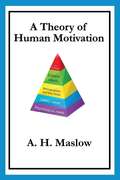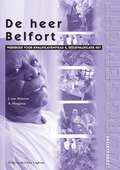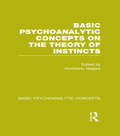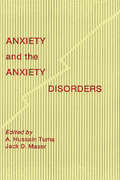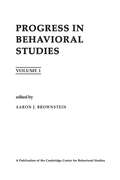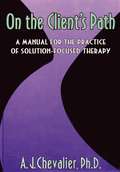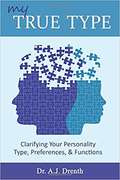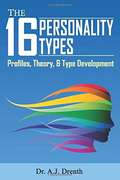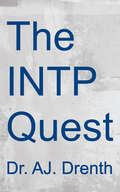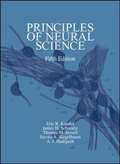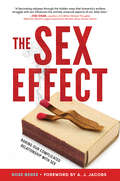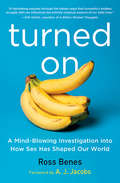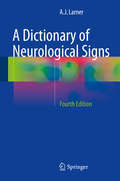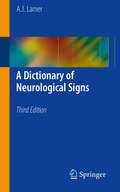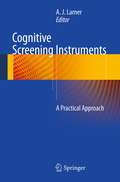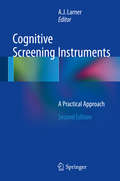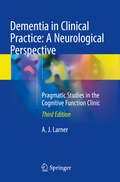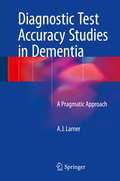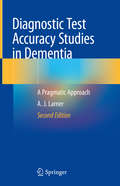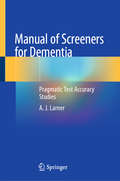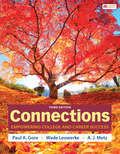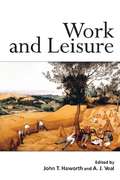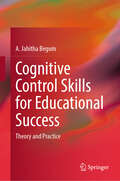- Table View
- List View
Life in the Consulting Room: Portraits
by A. H. BrafmanLife in the Consulting Room offers a series of noteworthy vignettes that occurred in the author's consulting room. Although the context and objective of each consultation varied, the decision to present them here is due to a particularly interesting feature of the patient's life or a significant point that arose during their interview with the author. Many of the cases have issues of academic interest but these are not pursued here. Instead, these accounts should be seen as portraits, "snapshots" that were considered emotionally interesting and intellectually stimulating. Some of these patients were in short- or long-term therapy, but most cases were being assessed to determine whether psychotherapy was in fact the best way of helping them. No doubt all psychodynamic practitioners will have met some of these findings in their practice, but the present book offers a particularly significant collection of clinical episodes.
A Theory of Human Motivation
by A. H. MaslowThe present paper is an attempt to formulate a positive theory of motivation which will satisfy these theoretical demands and at the same time conform to the known facts, clinical and observational as well as experimental. It derives most directly, however, from clinical experience. This theory is, I think, in the functionalist tradition of James and Dewey, and is fused with the holism of Wertheimer, Goldstein, and Gestalt Psychology, and with the dynamicism of Freud and Adler. This fusion or synthesis may arbitrarily be called a 'general-dynamic' theory. It is far easier to perceive and to criticize the aspects in motivation theory than to remedy them. Mostly this is because of the very serious lack of sound data in this area. I conceive this lack of sound facts to be due primarily to the absence of a valid theory of motivation. The present theory then must be considered to be a suggested program or framework for future research and must stand or fall, not so much on facts available or evidence presented, as upon researches to be done, researches suggested perhaps, by the questions raised in this paper.
De heer Belfort
by A. Haagsma J. Sevenhuijsen J.H. van MeterenZorgcategorie: Geriatrische zorgvragerSetting: Het geriatrisch netwerkKorte inhoud: Deze casus gaat over meneer Belfort en zijn dementie. De verschillende fasen van dementie, de achtergrond en rol van de familie en omgeving komen aan bod, evenals het geriatrisch netwerk van de huisarts, thuiszorg, het algemeen ziekenhuis, de GAAZ, het verpleeghuis en de alternatieve woongroepvormen.
Basic Psychoanalytic Concepts on the Theory of Instincts (Basic Psychoanalytic Concepts)
by Humberto Nagera S. Baker A. Holder M. Laufer D. Meers K. Rees R. EdgcumbeOriginally published in 1970, this volume describes in condensed but detailed form Freud’s development of the theory of instincts. As is well known, Freud reformulated and amplified his theory of instincts at several points during his lifetime. Such periodical amplifications and reformulations were made necessary by a number of factors, for as Freud gained experience he not only developed fresh insights but also was faced with the problem of explaining an increasing amount of clinical phenomena that offered itself for examination under the psychoanalytic microscope. There can be no doubt that Freud considered his theory of instincts as one of the corner stones of psychoanalysis and yet at the same time he recognised that it was an area where many of his formulations were necessarily of a tentative character and open to discussion and modification. In this volume the reader will be able to follow the development of Freud’s thought from his initial discovery of the duality of ‘sexual’ and ‘ego’ instincts and his recognition of the fundamental importance of the aggressive forces in human nature and behaviour, to the formulation of his theories regarding life and death.
Anxiety and the Anxiety Disorders
by A. Hussain Tuma and Jack MaserThe 1980s have been called the decade of anxiety. Not only is this true of the popular press, but students of behavior and psychopathology have contributed to the rather sudden reemergence of anxiety as a respectable and fascinating field of investigation. This volume is a culmination of more than two years of planning, literature reviews, writing, conference discussions, revising of original papers, and integrating the material for final publication. It is a series of interrelated statements about research on anxiety and the anxiety disorders written by many of the leading investigators currently active in this field. First published in 1985. Routledge is an imprint of Taylor & Francis, an informa company.
Progress in Behavioral Studies: Volume 1
by A. J. Brownstein R. Epstein P. HarzemAdvancing the study of behavior and its humane applications in society, this book explores behavioral studies and the analysis of behavior.Progress in Behavioral Studies outlines the contributions of behavioral science to education, behavioral medicine, and other related disciplines. Individual papers report on progress made through the cautious introduction of quantitative formulations into analysis, the increased interchange of analysis with other disciplines such as economics and ethology, and the continuation of behavioral science as a basis for understanding more complex phenomena.
On the Client's Path: A Manual for the Practice of Brief Solution-focused Therapy
by A. J. ChevalierAccording to the solution-focused model, the answer to a client's problem will ultimately come from the client's own repertoire of coping strategies. On the Client's Path provides everything you need in terms of theory and the step-by-step components of the solution-focused process. It shows how this therapy can be applied to a variety of clients in a range of clinical and medical settings. Additional chapters cover worst-case scenarios and crisis situations. Numerous case notes offer client-therapist dialogues drawn from a broad range of case histories.
My True Type: Clarifying Your Personality Type, Preferences and Functions
by A. J. DrenthWho am I? What is my purpose? What should I be doing with my life? These are important questions that we all must wrestle with. Further complicating matters is the fact that we live in a world where firm answers are increasingly hard to come by. While the options available to us continue to expand exponentially, there seem to be fewer reliable standards for guiding and informing our decisions. This can leave us feeling lost and overwhelmed, unsure of where to turn for answers to our most pressing questions. More specifically, we come to typology seeking a more objective understanding of who we are. We want to know where we fit into the bigger picture of humanity. Given these high hopes and expectations, it is unfortunate that so many people encounter an unexpected hurdle at the very outset of their typological journey--type confusion. Although they may have been furnished a type (e.g., INFJ) after taking a personality assessment, upon further investigation, they may come to doubt its accuracy. This may prompt them to retake the test.
The 16 Personality Types: Profiles, Theory, and Type Development
by A. J. DrenthThis book offers in-depth descriptions and analyses of each of the 16 personality types. Each personality profile contains an introduction, an examination of type development over the lifespan, and detailed explorations of the type’s personality functions and inner struggles.
The INTP Quest: INTPs' Search for Their Core Self, Purpose, and Philosophy
by A. J. DrenthINTPs are equal parts thinker and seeker. While their status as nuanced and critical thinkers rarely goes unrecognized, their seeking side is often overlooked. This is largely due to the fact they do most of their seeking inwardly, that is, by way of thinking. Recognizing life’s brevity, INTPs strive to craft a life that is important, meaningful, and authentically reflects who they are. In so doing, they feel compelled to clarify their understanding of three key things: their core self, their purpose, and their philosophy / worldview. Only by clarifying these foundational matters can INTPs be sure they have done everything possible to optimize their lives. Unfortunately, the INTP quest is rarely simple or straightforward, and it often extends far longer than they anticipate. Plagued by doubt and uncertainty, some INTPs may worry that they may never find what they are looking for and that all their explorations will have been for naught. However, those who persist in their quest have good reason for hope. While their destination may not look quite as shiny or glorious as they originally imagined, it is nonetheless worth the wait, capable of furnishing them with an enduring sense of meaning and satisfaction. This book explores the deep existential concerns that INTPs strive to understand and resolve through their quest.
Principles of Neural Science, Fifth Edition
by Eric R. Kandel James H. Schwartz Thomas M. Jessell Steven A. Siegelbaum A. J. HudspethUltimately, Principles of Neural Science affirms that all behavior is an expression of neural activity, and that the future of clinical neurology and psychiatry hinges on the progress of neural science. Far exceeding the scope and scholarship of similar texts, this unmatched guide offers a commanding, scientifically rigorous perspective on the molecular mechanisms of neural function and disease―one that you’ll continually rely on to advance your comprehension of brain, mind, and behavior.
The Sex Effect: Baring Our Complicated Relationship with Sex
by A. J. Jacobs Ross BenesA gripping exploration of the relationship between sex and our society, with a foreword by bestselling author A.J. JacobsWhy do political leaders become entangled in so many sex scandals? How did the U.S. military inadvertently help make San Francisco a mecca of gay culture? And what was the original purpose of vibrators? Find out the answers to all these questions and more as journalist Ross Benes delves into the complicated relationship between everyday human life—including religion, politics, and technology—and our sexuality.Drawing on history, psychology, sociology, and more, The Sex Effect combines innovative research and analysis with captivating anecdotes to reveal just how much sex shapes our society—and what it means for us as humans as we continue to struggle with the wide-ranging effects our sexuality has on the world around us.
Turned On: A Mind-blowing Investigation Into How Sex Has Shaped Our World
by A. J. Jacobs Ross BenesDo you think sex only shapes our lives in the bedroom? Think again.Your breakfast cereal. Your neighborhood's crime rate. Even your Amazon Prime account. Believe it or not, nearly every aspect of modern life has been shaped in some way by sex. In this fascinating journey through the human psyche, journalist Ross Benes digs deep into the hidden relationship between everyday human existence—including religion, politics, technology, and more—and our sexuality.Ranging from discussions of how the U.S. military inadvertently helped make San Francisco a mecca of gay culture to the original purpose of vibrators, Turned On is a revealing look at just how much sex shapes our society, and how debunking common myths and attitudes about sex can help us better understand what really influences human behavior as we continue to grapple with the wide-ranging effects our sexuality has on the world around us.
A Dictionary of Neurological Signs, 4th Edition: Clinical Neurosemiology
by A. J. LarnerThis updated and expanded Fourth Edition is an alphabetical listing of commonly presenting neurological signs designed to guide the physician toward the correct clinical diagnosis. The dictionary is focused, problem-based and concise. <P><P> The structured entries in this practical, clinical resource provide summaries of a wide range of neurological signs. Each entry includes: a definition of the sign; a brief account of the clinical technique required to elicit the sign; a description of the other signs which may accompany the index sign; an explanation of pathophysiological and/or pharmacological background; differential diagnosis; brief treatment details; and where known, the neuroanatomical basis of the sign. <P><P> A Dictionary of Neurological Signs, Fourth Edition, is an indispensable reference for all students, trainees, and clinicians who care for patients with neurological disorders, and could also be used in preparation for exams, since each entry is a snapshot of a specific disorder or disease.
A Dictionary of Neurological Signs, Third Edition
by A. J. LarnerThe first two editions of the Dictionary of Neurological Signs were very well-received by readers and reviewers alike. Like those editions, this Third Edition, updated and expanded, can be almost as well described in terms of what the book is not, along with details about what it is. The Dictionary is not a handbook for treatment of neurological disorders. While many entries provide the latest treatment options, up-to-the-minute therapies are not discussed in bedside level detail. The Dictionary is not a board review book because it is not in Q&A format but could easily serve in that capacity since each entry is a fairly complete snapshot of a specific disorder or disease. The Dictionary is an alphabetical listing of commonly presenting neurological signs designed to guide the physician toward the correct clinical diagnosis. The Dictionary is focused, problem-based, concise and practical. The structured entries in this practical, clinical resource provide a thumbnail of a wide range of neurological signs. Each entry includes: * A definition of the sign * A brief account of the clinical technique required to elicit the sign * A description of the other signs which may accompany the index sign * An explanation of pathyophysiological and/or pharmacological background * Differential diagnosis * Brief treatment details Where known, these entries also include the neuroanatomical basis of the sign. The Dictionary of Neurological Signs, Third Edition, is an indispensable reference for all students, trainees, and clinicians who care for patients with neurological disorders.
Cognitive Screening Instruments: A Practical Approach
by A. J. LarnerCognitive Screening Instruments: A Practical Approach provides a practical and structured overview of some of the most commonly used and easily available cognitive screening instruments applicable in the outpatient clinic and bedside setting. Dementia and cognitive disorders are now recognised as an increasing public health problem, both in terms of patient numbers and cost, as populations age throughout the world. Despite this, many patients with dementia never receive a formal diagnosis, with implications for their appropriate care and management. Diagnostic tests which identify cases of dementia therefore have an important role. Expert authors from around the world equip the reader of Cognitive Screening Instruments: A Practical Approach with clear instructions on the usage of each screening instrument, its strengths and weaknesses, the time required for administration, and rules on scoring, such as how to correct for variations in the patient's age or education, and suggested cut-off scores. Cognitive Screening Instruments: A Practical Approach is a handy, illustrated guide and a valuable diagnostic aid for practitioners working closely with patients with dementia and mild cognitive impairment. This volume will be of use both to clinicians and to professionals in disciplines allied to medicine who are called upon to assess patients with possible cognitive disorders, including neurologists, old age psychiatrists, neuropsychologists, primary care physicians, dementia support workers, and members of memory assessment teams.
Cognitive Screening Instruments: A Practical Approach
by A. J. LarnerCognitive Screening Instruments: A Practical Approach provides a practical and structured overview of some of the most commonly used and easily available cognitive screening instruments applicable in the outpatient clinic and bedside setting. Dementia and cognitive disorders are now recognised as an increasing public health problem, both in terms of patient numbers and cost, as populations age throughout the world. Despite this, many patients with dementia never receive a formal diagnosis, with implications for their appropriate care and management. Diagnostic tests which identify cases of dementia therefore have an important role. Expert authors from around the world equip the reader of Cognitive Screening Instruments: A Practical Approach with clear instructions on the usage of each screening instrument, its strengths and weaknesses, the time required for administration, and rules on scoring, such as how to correct for variations in the patient's age or education, and suggested cut-off scores. Cognitive Screening Instruments: A Practical Approach is a handy, illustrated guide and a valuable diagnostic aid for practitioners working closely with patients with dementia and mild cognitive impairment. This volume will be of use both to clinicians and to professionals in disciplines allied to medicine who are called upon to assess patients with possible cognitive disorders, including neurologists, old age psychiatrists, neuropsychologists, primary care physicians, dementia support workers, and members of memory assessment teams.
Dementia in Clinical Practice: Pragmatic Studies in the Cognitive Function Clinic
by A. J. LarnerThis expanded, updated third edition summarizes the pragmatic diagnostic accuracy studies of neurological signs and cognitive and non-cognitive screening instruments undertaken in the author’s clinic in the context of day-to-day practice involving patients with cognitive disorders including dementia. A new chapter devoted to comparing and combining instruments is included, and illustrative case studies have been included where relevant. Dementia in Clinical Practice: A Neurological Perspective, Third Edition is a practical resource for medical professionals involved in the assessment and management of patients with dementia and cognitive disorders. It may be of particular interest to neurologists, psychiatrists, geriatricians, primary care practitioners and those working with patients with cognitive impairment in the fields of neuropsychology, psychology, occupational therapy, speech and language therapy and nursing.
Diagnostic Test Accuracy Studies in Dementia
by A. J. LarnerThis book explains the key steps in planning and executing diagnostic test accuracy studies in dementia, with clear explanations of difficulties and pitfalls and with jargon clearly explained. The emphasis is on pragmatic diagnostic test accuracy studies which can be integrated into day-to-day clinical practice. The book is based on the author's experience over more than 10 years, which has resulted in the publication of many diagnostic test accuracy studies. The text is structured as for a research publication on a diagnostic test accuracy study (Introduction, Methods, Results, Discussion), with a final chapter on Future Prospects. Each of the chapters is devoted to a practical and structured overview of each of these steps in performing and writing up such a study. Diagnostic Test Accuracy Studies in Dementia: A Pragmatic Approach is aimed at any clinician with an interest in dementia disorders: old age psychiatrists, geriatricians, neurologists, neuropsychologists and primary care physicians, as well as other professions allied to medicine. The book is also of interest to any clinician/researcher with an interest in diagnostic test accuracy studies.
Diagnostic Test Accuracy Studies in Dementia: A Pragmatic Approach
by A. J. LarnerThe new and updated edition of this book explains the key steps in planning and executing diagnostic test accuracy studies in dementia, serving as an introduction to the topic with clear explanations of difficulties and pitfalls. It has been fully revised in light of developments over the past 5 years and includes STARD publications which have appeared since the first edition as well as the use of biomarkers of cognitive disorders as increasingly enshrined in diagnostic criteria. The book covers the presentation of study results in terms of measures of discrimination, taking examples from studies in dementia looking at various diagnostic methods including cognitive instruments, neuroimaging, and biochemical studies. The book continues to reflect the author’s own experience in diagnostic test accuracy studies, particularly in the sphere of cognitive screening instruments..Diagnostic Test Accuracy Studies in Dementia encourages clinicians to adopt a pragmatic approach to diagnostic test accuracy studies rooted in day-to-day clinical practice.
Manual of Screeners for Dementia: Pragmatic Test Accuracy Studies
by A. J. LarnerThis book draws on the author’s experience in conducting pragmatic test accuracy studies on screening instruments for dementia/mild cognitive impairment. To facilitate comprehension and assimilation, all data is presented in an easily accessible, succinct and user-friendly way by means of a structured tabular format that allows tests to be easily compared. The pragmatic design of studies ensures high external validity and generalizability for the test results. The book includes a wealth of data on previously presented studies, as well as hitherto unreported test measures (“Number needed” metrics). It presents recently described and new diagnostic metrics (Likelihood to be diagnosed or misdiagnosed; Summary utility index; Number needed for screening utility); data from new studies on screeners (Attended with sign; Free-Cog; Two question depression screener; Jenkins Sleep Questionnaire; Triple test); and previously unpublished data (combination of SMC Likert and MACE; IADL Scale and MMSE). Given its scope, the book will be of interest to all professionals, beginners and seasoned experts alike, whose work involves the assessment of individuals with cognitive (memory) complaints.
Neuropsychological Neurology
by A. J. LarnerEssential to the management of patients suffering from neurological disorders is an understanding of the cognitive aspects of these conditions. This book begins with an outline of the various cognitive domains and how they can be tested, before covering in depth the cognitive deficits seen not only in prototypical neurodegenerative cognitive disorders (Alzheimer's disease, frontotemporal dementias, Huntington's disease, prionoses), but also in other common neurological disorders which may be complicated by cognitive impairment (stroke, multiple sclerosis, Parkinson's disease, brain tumours). This book is an essential reference text for all neurologists, not just those with an interest in cognitive disorders; and for general physicians and specialists who deal with any endocrine, metabolic, vascular, or infective disorders which may compromise cognitive function. Practitioners of professions allied to medicine which involve contact with cognitively impaired patients will also find this text useful.
Connections: Empowering College and Career Success
by Paul A. Gore Wade Leuwerke A. J. MetzWritten by counseling psychologists Paul Gore, Wade Leuwerke, and A.J. Metz, Connections shows students from day one how to develop the mindset, drive, and strengths needed on their way to college, personal, and career success. The expertly designed program is firmly rooted in current research in positive psychology, using self-reflection as a tool for goal-setting; goal-setting as a tool for imagining one's potential; and imagining one's potential as the motivation for realizing it. Connections puts students at the center of their own personalized learning path, facilitates their purposeful choice of an academic and career plan, and develops all the skills they need--cognitive and non-cognitive, academic and life--to foster their self-growth and success.The thoroughly updated new edition addresses current challenges and research, including the growth of online learning (Appendix: Online Learning), diversity and inclusion (revised Chapter 11: Social Belonging), and the science of learning (revised Chapter 5: Understanding Thinking and Learning). These updates are reflected in a new version of ACES—the powerful, state-of-the-art student self-assessment the authors revised concurrently with Connections.
Work and Leisure
by A. J. Veal John T. HaworthGlobalization, economic development and changes in social environments have put the relationships between work, leisure, social structure and quality of life under the spotlight. Profound transformations in the nature and organization of work are occurring, with potentially far-reaching social and economic consequences. Increasingly, organizations demand greater flexibility from their workforces and are introducing new technologies and practices in response to global competitive pressures. At the same time many employees are experiencing long working hours, increasing workloads and job insecurity, along with the challenge of balancing work and domestic responsibilities. These changes threaten long-term gain in leisure time while, simultaneously, the leisure environment is also changing radically, as we see increasing commercialization and professionalization of leisure services and experiences, the influence of the Internet, the rise of gambling and the decline of community-based activity. Exploring all of these issues, this book brings together specially commissioned chapters from international experts in a wide range of disciplines concerned with work, leisure and well-being. Each author takes stock of the current position, identifies core practical and theoretical issues and discusses possible future trends in order to provide an invaluable resource for all policy-makers, educators, employers and researchers in the field.
Cognitive Control Skills for Educational Success: Theory and Practice
by A. Jahitha BegumThis book presents an exploration and application of cognitive control skills and their components. It discusses the role of the brain in the execution of cognitive control skills, and practical classroom strategies for teachers. Six main components of cognitive control skills such as working memory, attentional control, cognitive flexibility, self-regulation, inhibition, and meta-cognition are presented, with their importance for academic success highlighted. This book substantiates the assessment of each of the six main components of cognitive control skills<span style="font-variant-ligatures: normal; font-vari

